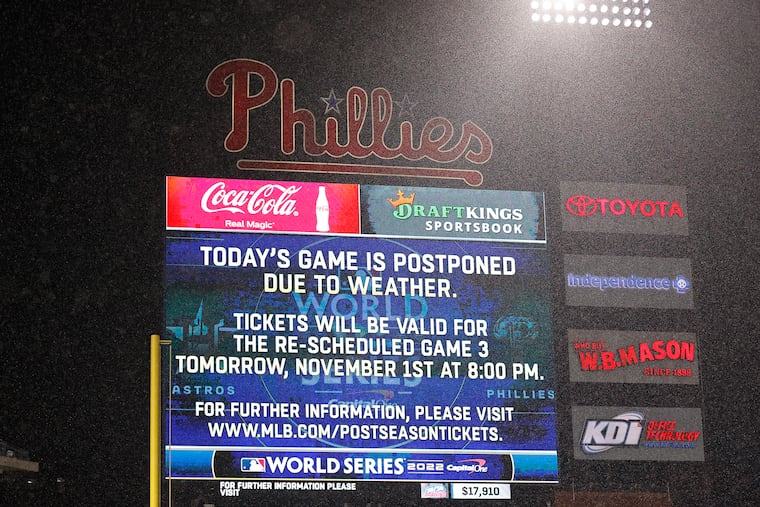For the Phillies and Major League Baseball, weather may be a bigger player than ever this season
This will be a season like no other, and baseball's weather services will have to be on top of their game.

Pitching, defense, hitting, luck, injuries all will have important roles in the 2023 MLB season.
So might the weather.
Especially this year, when scheduling makeup games could become particularly challenging in a season that will be like no other in the 150-year history of the game.
In their home-opening series with the Cincinnati Reds, the Phillies had a built-in off day Friday available for making up what turned out to be Thursday’s questionable postponement. Providing that cushion was wise on Major League Baseball’s part, because after Sunday the Reds aren’t due to come back to smell the cheesesteaks for the rest of the season.
» READ MORE: How come the Phillies postponed the home opern
Only divisional rivals are making return trips, but fewer than they did last year.
Rescheduling rainouts the rest of the season could be more troublesome.
Weather postponements have long been headaches, leading to playing games on what would have been precious off days later in the season or adding pitching-depleting doubleheaders at the worst possible times when late-season arms are weary. But the headaches may be bigger this time around.
What’s different
The Reds, Phillies, and every other team will be playing all 29 of the other Major League teams this season for the first time. But only divisional rivals will be making more than one visit to their opponents’ ballparks — and then only two, one less than last year.
» READ MORE: Rainouts and pitching scenarios: Here's a case study from 2022
“I can imagine it will present some scheduling issues if there are rainouts along the way,” said Bobby Martrich, meteorologist with EPAWA Weather Consulting, the Phillies’ local weather service.
“It’s just added pressure to get the games in,” said Howard Smith, the Phillies vice president for business affairs, who gets to live with these scheduling headaches. “It might be some long days for players, playing through rain delays.”
In fact, said Smith, had it not been the home opener, when special ceremonies were planned and people had planned “for months” to attend, the Phillies might have tried to play on Thursday, when the rains held off during the hours in which the game would have been played.
In the end, however, the team decided not to roll the bones and take advantage of the open date, a luxury that won’t be there all that often the rest of the way.
Nonfrequent visitors
Major League Baseball officials, who will have final say on postponements for about 85% of all games, acknowledge that the changes in the divisional games could create complications.
Last season, the Phillies-Mets game scheduled for May 6 at Citizens Bank was rained out. No big deal: It was rescheduled for Aug. 20, during New York’s third visit to Philly.
This time around, the Mets won’t be back a third time.
This season the makeup windows are going to be tighter, given that the Mets, Atlanta Braves, Washington Nationals, and Florida Marlins will be coming to town only twice.
» READ MORE: Now this was a rain delay ....
The upshot is that teams are likely to make extra efforts to get games in the first time around, and that could mean more games in less-than-ideal conditions, and more rain delays, not a favorite among players and ticketholders.
‘Brainstorm’
But their part, the Phillies say, will go only so far. “Obviously, we want to get the game in,” Smith said, but they are concerned about the safety of the players and the potential inconveniences to the fans.
He said when rain is threatening, he, head groundskeeper Jeremy Wilt, and other key officials gather for a “brainstorm.”
The Phillies get to make the postponement call only on divisional games and only during the first half of the season. Major League Baseball ultimately has the call on the rest, but, as it did for the home opener, it consults with the Phillies, who have a better handle on local conditions.
MLB retains at least two private weather services, and the Phillies, three, including Martrich’s firm.
Getting it wrong might cost you a game, or even one of the six post-season slots, especially if you happen to have your ace pitcher starting the game.
“If you have Aaron Nola pitching, and you start him for the first half of an inning and it starts pouring, then you’ve lost him for the night,” said Smith. On the other hand, the Phillies appeared to benefit from a rainout in Game 3 of the 2022 World Series. Ranger Suarez was able to start that game, instead of Noah Syndergaard, who had not pitched much in the postseason, and the Phils shut out the Astros to take a 2-1 lead, their final win of the series.
» READ MORE: Rain appeared to work to the Phillies' advantage during the 2022 World Series
Smith said some franchises, whom he declined to identify, are not above postponing a game under questionable circumstances to get a better pitching matchup.
Conversely, on a day when a near-certain rainout looms, some will open the gates to generate some parking and beer revenue.
He insisted the Phillies don’t play those games.
Rain delays once the game starts are in the hands of the umpire crew chief, who gets plenty of help from Wilt.
Wilt, for his part, relays what he knows and what his inner weather nerd tells him to the opposing manager and the umpire crew chief, without regard to pressure from anyone to get the game in, he said.
Delays do happen. The Phils had some beauts last year, seven rain delays, plus two rainouts and a suspended game.
This season, if you’re at Citizens Bank Park and it starts raining, don’t expect a quick call on postponing the game.